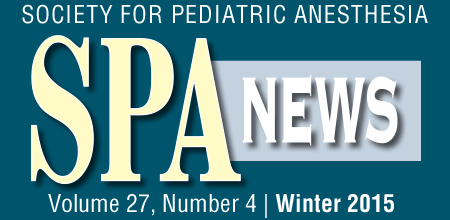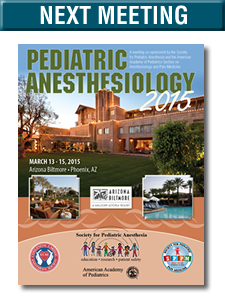asa meeting reviews
Clinical Forum: What should you do when you think the patient shouldn’t have surgery at all?
By Stephen R. Hays, MD, FAAP
Vanderbilt University School of Medicine
The Society for Pediatric Anesthesia (SPA) was well represented at Anesthesiology 2014 in New Orleans this past October, with members leading several 90-Minute Panels and Clinical Forums over the course of the meeting. Continuing the palliative care theme of her closing presentation at the SPA 28th Annual Meeting two days previously, SPA immediate past-president Nancy Glass, MD, MBA, FAAP (Texas Children’s Hospital) led a Clinical Forum: What should you do when you think the patient shouldn’t have surgery at all? The Clinical Forum was assigned to the Professional Issues Track, and designated an official Ethics presentation.
Dr. Glass was initially joined on the dais by Douglas B. Coursin, MD (University of Wisconsin Hospital) and Stephen R. Hays, MD, FAAP (Monroe Carell Jr. Children’s Hospital), and finally by David B. Waisel, MD (Boston Children’s Hospital). Three of the four panelists are pediatric anesthesiologists, although the session was intended to address broad issues applying to patients of all ages. Despite the mid-afternoon start, over 100 practitioners from across the spectrum of anesthesiology practice forewent fun in the Big Easy to attend.
Dr. Glass opened the session by thanking those in attendance, expressing her hope of exploring the difficult issue of caring for patients who perhaps should not be having surgery at all.
Dr. Coursin provided the first formal presentation, sharing his perspectives as a provider, receiver, and observer of end-of-life care. Trained as an internist, anesthesiologist, and intensivist, Dr. Coursin noted he has observed the evolution of palliative care locally at his own institution and nationally as a formally boarded medical specialty, and has served as an advisor to a hospice agency in his community. He spoke about his experiences with end-of-life care provided to several family members in recent years, all of whom were able to avoid unnecessary surgery or ICU admission before death. Dr. Coursin noted the difficulty navigating palliative care systems, even for someone familiar with it, and lamented the decreasing role of the primary provider in today’s increasing complex hospital-based care environment.
Dr. Coursin then discussed options available to the anesthesiologist faced with a patient for whom surgery is of uncertain benefit, from the easy choice of proceeding and hoping for the best, to the hardest, but generally optimal, option of waiting until all parties involved have adequately discussed pertinent issues and come to agreement on the best plan of care. Dr. Coursin acknowledged this may be difficult, stressing the importance of a multi-disciplinary team approach. He cited several recent articles indicating frequencies of hospitalizations, including ICU admission near the end of life, have increased in recent years despite greater availability of hospice and palliative care, suggesting such care is too often provided too little and too late. Dr. Coursin concluded by recommending the book Knocking on Heaven’s Door by Katy Butler as a thoughtful exploration of ways to improve the death experience.
Dr. Glass then presented a series of clinical cases for discussion. She began with a quotation from the poem Ceremony, by the Native American writer Leslie Marmon Silko, about the importance of our patients’ stories: “I will tell you something about stories, they aren’t just entertainment. Don’t be fooled. They are all we have, you see, all we have to fight off illness and death.” Counterpoints and additional observations were provided by Dr. Hays and Dr. Coursin after each case presentation.
Dr. Glass first presented a case provided by Dr. Coursin of an elderly gentleman with multiple significant medical co-morbidities presenting for preoperative evaluation before planned aggressive resection of pharyngeal cancer: the patient is weak, tired, and unsure regarding surgery; the family questions whether the patient should proceed; the surgeon is unavailable. All panelists agreed the optimal course would be to delay surgery pending discussion by all parties including the surgeon, although this may be difficult and requires a multi-disciplinary team approach. The patient eventually decided not to pursue surgery, and ultimately died comfortably at home under hospice care. Dr. Coursin noted the unfortunate rarity of this positive outcome.
Drawing upon her own experience, Dr. Glass then presented a case of a toddler with a chromosomal disorder, already in hospice care, who after incidental diagnosis of an intra-abdominal tumor is scheduled for multiple invasive procedures and interventions. Dr. Glass used the case to discuss the role of the hospital ethics committee, suggesting ethics consultation when patients and/or caregivers disagree on, or feel uncomfortable with, trajectory of care. The ethics committee was consulted for this child, and recommended against aggressive care. The family was relieved at this recommendation, and declined further surgery. Dr. Glass noted this patient did receive aggressive care when brought by the family to a local emergency department at the end of life, underscoring how palliative care does not always proceed as planned.
Again drawing upon her own experience, Dr. Glass then discussed a case of a neonate with hydranencephaly on home hospice care with progressive hydrocephalus and rapidly expanding head circumference, whose parents elected to pursue shunt placement to ease care at home. Preoperative discussion verified the family’s goal to avoid long-term mechanical ventilation, and to return the infant home as quickly as possible. After a smooth intraoperative course and extubation in the OR, however, the infant developed intermittent apnea and upper airway obstruction. Panelists discussed various options, including re-intubation and ICU admission with eventual palliative extubation. A laryngeal mask airway (LMA) was placed; the patient was brought to the recovery room for LMA removal in the mother’s arms; after an uneventful night, the infant was discharged home the next day. Dr. Glass emphasized the importance of coordinating care with the palliative care team, and enumerated other potential resources.
Dr. Waisel spoke about when and how to engage an ethics committee, drawing upon his experience with the Ethics Advisory Committee at Boston Children’s Hospital. Dr. Waisel noted all hospitals in the United States are required to have a mechanism for addressing ethical concerns, although the composition, availability, and clinical utility of such mechanisms vary. Ethics committees are frequently led by professionals with specific training in ethics, and generally include representatives from numerous disciplines and specialties. Dr. Waisel described how Ethics Advisory Committee consultation at his institution can be requested by anyone, anonymously if desired. Anonymity may promote individual willingness to seek ethics committee consultation by reducing fear of retaliation or other negative consequences, but may hamper the committee in developing a complete understanding of the reason for consultation. Dr. Waisel echoed earlier comments by Dr. Glass suggesting ethics consultation when patients and/or caregivers disagree on, or feel uncomfortable with, trajectory of care. Dr. Waisel stressed an ethics committee cannot mandate what is right, but can provide reasoned objective opinions regarding patients and their care. He encouraged early ethics committee consultation whenever possible, avoiding last-minute involvement preventing thoughtful assessment and meaningful recommendations.
Dr. Glass concluded the session by thanking the panelists for their participation, and those still in attendance for their perseverance. Questions were answered by the panelists from the dais until the session officially ended, and in one-on-one interactions for some time after that. Plans are already under way for more palliative care-themed panels and forums at Anesthesiology 2015 next October in San Diego. Please join us!



